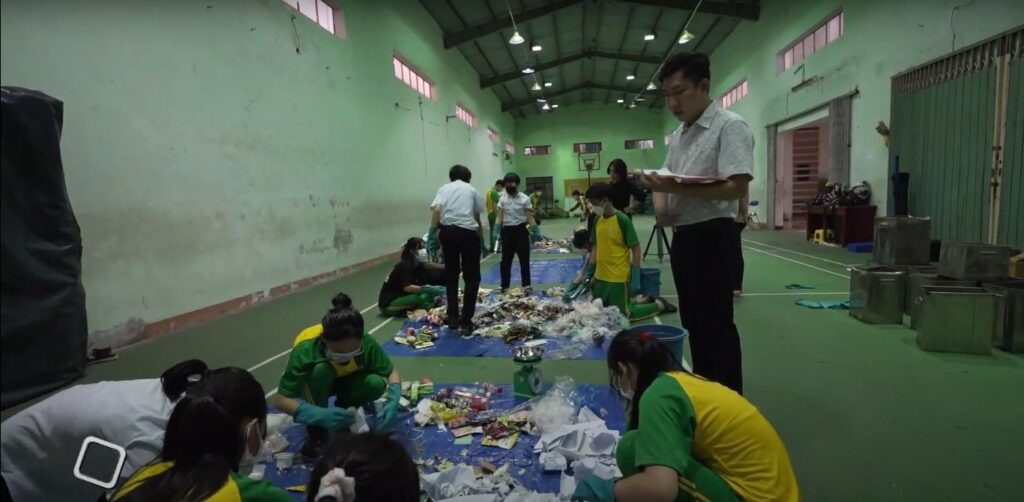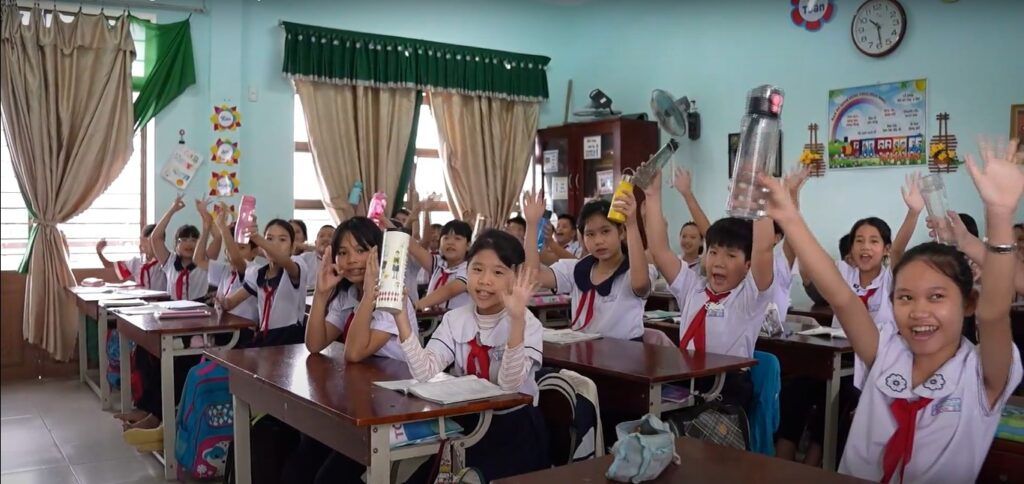Students can become agents of behavior change towards the plastic waste problem.
TARGET USERS: Educational Institution, Teacher, Student
KEY CONSIDERATIONS: The exact implementation can be adapted to different school conditions and students’ attitudes towards the issue. Besides direct engagement and behaviour change aimed at students, a potential knock-on effect is that students and youths can influence their families and communities
THE PROBLEM
The global plastic pollution crisis must be introduced early to the younger generation, as focusing only on disposal and infrastructure is not enough to change public consumption and waste disposal patterns. implement the solutions in the school area hopefully will lead to the behaviour change of younger generations. Implementing the solutions in the schools will hopefully lead to the behaviour change of younger generations.
THE SOLUTION
With increased and consistent awareness among the younger generation, this can help change consumer behaviour in the coming decades as students graduate and start to have purchasing power. Meanwhile, students and youths are a strong connection for spreading the message and influencing their families and potentially, their wider communities.
The project “Mitigating Marine Plastic Debris in Viet Nam”, represented by WWF-Viet Nam, governed by the Ministry of Natural Resources and Environment, and managed by the Agency of Seas and Islands, decided to pilot the Plastic Waste Free Schools model to emphasise and prioritise students as ambassadors of positive environmental actions, starting with waste management.
Model Implementation is broken into the following steps:
Step 1: Introducing the model to schools.
Step 2: Focus group discussions with representatives of the school board, teachers, and students.
Step 3: Conduct waste audits for the entire school, or partially by selecting a “pilot area”.
Step 4: Surveying the knowledge, attitudes, and practices of teachers and students regarding plastic pollution.
Step 5: Analyze the results from discussions and audits to develop action plans for schools.
Step 6: Support schools to establish working groups and student clubs to implement the plan.
This project aims to change student behavior in plastic use, consumption, and plastic waste management with these three following activities:
- Advocating to integrate criteria on waste classification and plastic reduction into the standard of “Green – Clean – Bright – Safe – Friendly School”, which are promoted by local Departments of Education and Training annually;
- Developing and issuing school rules for waste classification and plastic reduction in all schools;
- Integrating environmental protection and plastic waste reduction into students’ curricular and extracurricular activities.

In the case of Viet Nam, through the plastic-free school model, teachers and students were provided with helpful information and practical activities, including waste audits, waste separation, and treatment, such as composting, indigenous microorganism (IMO) production, collecting and selling recyclables to raise funds to support underprivileged students, organising communication events and contests on environmental issues of plastic waste.
CASE STUDY EXAMPLES
Implementation in Thanh Khe, Phu Yen, and Ha Tinh (25 schools)
In 2023, with the support from the Project and Center for Adaptive Capacity Building (CAB), 6 schools in Thanh Khe have developed and implemented the Plastic Reduction Action Plan.
Meanwhile, with the Center for Supporting Green Development (GreenHub) there are 13 schools in Phu Yen and 6 schools in Ha Tinh that are participating in the action plan. All of them issued the policy related to plastic waste reduction, such as no printed Hiflex banners/posters, no SUP bottles in meetings, no balloons in school events, no (or reduced) nylon book covers, and reduced SUP at canteen as much as possible.
Implementation in A Loui (5 schools)
There are 5 primary and secondary schools in A Loui District (Thua Thien Hue province) that have been implementing the model. The school staff participating in the model also integrate the contents of environmental protection and plastic waste reduction into some subjects within the programme, while conducting trial teaching in the lectures.
Implementation in Hue City (52 schools)
A total of 52 primary and secondary schools implemented the “Zero-waste School” model. Various plastic reduction practices have been applied in schools, e.g. integration of contents of waste separation at source and plastic waste reduction, were introduced to students to practise in every single school participating in the project. A published teaching reference book on plastic reduction was introduced to teachers of all schools in Hue City with diverse activities categorised in subjects. More than 200 teachers were face-to-face trained to apply the book content to their teaching.
Additionally, these schools participated in abundant extra-curricular activities that were organized and involved by the project and partners (e.g. painting contest, Ringing Jingle Bell, Broadcasting Club, etc.). They have the opportunity to experience a day as an environmental worker, which is aimed at strengthening students’ awareness on environmental protection and increasing their appreciation for the daily tasks required to keep Hue clean. In order to create a network of zero-waste schools in Hue City, a Recycling Fair was organised as an event for both teachers and students to share their own experiences, enjoy visiting recycling booths and exchange their separated recyclable waste for presents.

Implementation at 3 marine protected areas of Phu Quoc, Con Dao, and Cu Lao Cham (7 schools)
In the school year of 2022-2023, the Project has continued to coordinate with the Education and Training Department of Phu Quoc City, Con Dao district’s Department of Education and Training, and Cu Lao Cham Marine Protected Area Management Board to implement the plastic reduction activities in 5 schools. Here are the following action plans:
- Conduct educational and communication activities to raise awareness and change teachers’ and students’ behaviours towards waste separation at source and plastic waste reduction.
- Conduct advanced training sessions for staff and teachers and soft skills sessions for students through the activities of the Environment Club.
- Develop and implement specific regulations to promote waste separation at source and reduce plastic in schools.
Implementation in Con Dao District
The Plastic Reduction Model at school was launched at Cao Van Ngoc High School on December 21, 2022, and at Le Hong Phong Secondary School on February 17, 2023, with the target of fostering commitment to plastic reduction and introducing practical activities to implement the model. Following the launch, activities such as single-use plastic reduction, waste sorting and recycling were carried out monthly to provide more information to all students, teachers and staff.
In addition, there was also an attempt to form a model for the Environment Club in every school. The goal is that the core members of the club who have been trained can share knowledge and share information to reduce plastic pollution. Similarly, at Le Hong Phong Secondary School, the Project conducted a training session to improve knowledge about plastic and its adverse effects on humans and the environment, with the participation of 70 members of its GreenClub.
Implementation in Cu Lao Cham Island
On December 12th 2022, the Management Board of Cu Lao Cham Marine Protected Area coordinated with Quang Trung Primary and Secondary School to set up recyclable waste collection sites and information boards, aiming to raise awareness for students on waste separation and recycling to create a new life cycle for plastic waste instead of directly discharge into the environment.
Moreover, the school organised the “I love The Green Island – My Hometown” Club for students to learn about environmental protection, waste reduction and treatment, and biodiversity conservation in the Marine Protected Area.
Implementation in Phu Quoc
After the launch, the “Mitigating Marine Plastic Debris in Viet Nam” Project has spawned various exciting activities for teachers and students. First, there was a poster design competition aimed at introducing the plastic waste issue and encouraging the students to self-research and create a call to action for the plastic pollution issue. Further, the school started an “Environmental Club” training for teachers, and an extracurricular program called “Plastic and Me” to increase knowledge of plastic, plastic waste, and its impact on life on earth and increase action to reduce plastic waste and sort plastic waste.
List of Plastic Waste Free Schools across Viet Nam
Over 100 schools across Viet Nam are engaged in the Plastic Waste Free School project. At least 7 schools are engaged in districts that are also in or around Marine Protected Areas..
Con Dao District:
- Cao Van Ngoc High School
- Le Hong Phong Secondary School
- Vo Thi Sau-Con Dao High School
Cu Lao Cham:
- Quang Trung Primary School
- Quang Trung Secondary School
Phu Quoc City:
- Nguyen Trung Truc Primary School
- Nguyen Trung Truc Secondary School
In cities outside of Marine Protected Areas:
In A Luoi district (5 schools)
- Kim Dong Primary School
- Son Thuy Primary School
- Le Loi Secondary School
- Tran Hung Dao Secondary School
- Quang Trung Secondary School
Thanh Khe: 6 schools
Phu Yen: 13 schools
Ha Tinh: 6 schools


